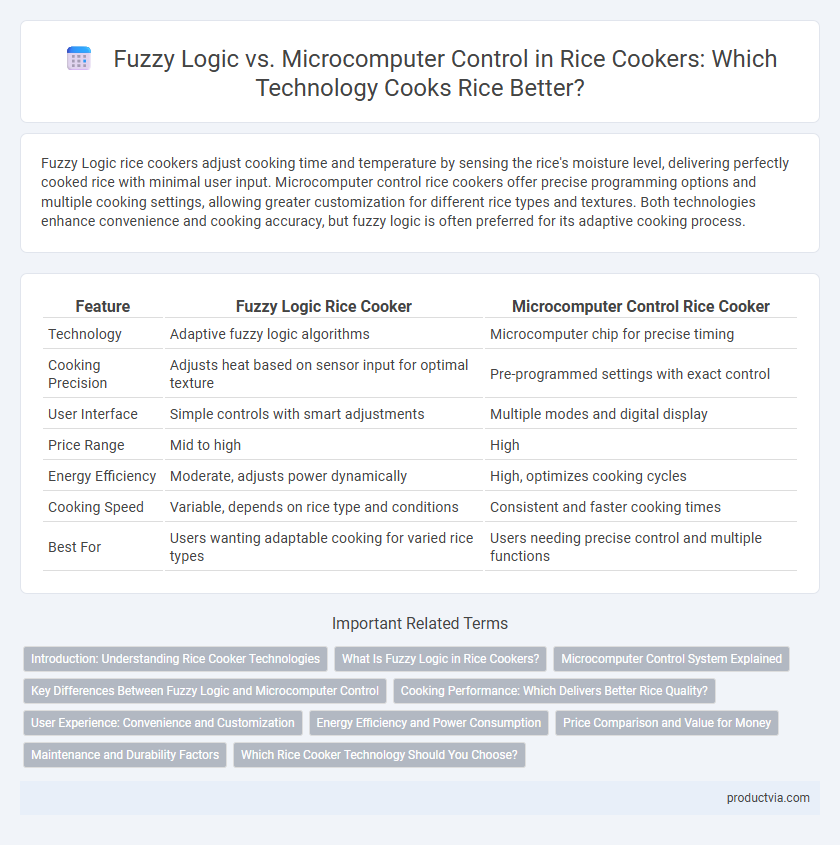Fuzzy Logic rice cookers adjust cooking time and temperature by sensing the rice's moisture level, delivering perfectly cooked rice with minimal user input. Microcomputer control rice cookers offer precise programming options and multiple cooking settings, allowing greater customization for different rice types and textures. Both technologies enhance convenience and cooking accuracy, but fuzzy logic is often preferred for its adaptive cooking process.
Table of Comparison
| Feature | Fuzzy Logic Rice Cooker | Microcomputer Control Rice Cooker |
|---|---|---|
| Technology | Adaptive fuzzy logic algorithms | Microcomputer chip for precise timing |
| Cooking Precision | Adjusts heat based on sensor input for optimal texture | Pre-programmed settings with exact control |
| User Interface | Simple controls with smart adjustments | Multiple modes and digital display |
| Price Range | Mid to high | High |
| Energy Efficiency | Moderate, adjusts power dynamically | High, optimizes cooking cycles |
| Cooking Speed | Variable, depends on rice type and conditions | Consistent and faster cooking times |
| Best For | Users wanting adaptable cooking for varied rice types | Users needing precise control and multiple functions |
Introduction: Understanding Rice Cooker Technologies
Fuzzy logic rice cookers use advanced algorithms to adjust cooking time and temperature based on continuous feedback, ensuring precise and consistent results. Microcomputer control systems rely on programmed settings and sensors to automate cooking cycles, offering user-friendly interfaces and reliable operation. Comparing these technologies highlights differences in adaptability, cooking precision, and overall performance in modern rice cookers.
What Is Fuzzy Logic in Rice Cookers?
Fuzzy logic in rice cookers enables the appliance to mimic human decision-making by analyzing temperature, cooking time, and moisture levels to adjust the cooking process dynamically. This technology allows for precise control over rice texture by handling imprecise inputs, unlike traditional microcomputer control systems that operate on fixed programs. Fuzzy logic enhances cooking accuracy and consistency, resulting in perfectly cooked rice tailored to varying types and quantities.
Microcomputer Control System Explained
Microcomputer control systems in rice cookers use advanced sensors and processors to precisely regulate temperature, cooking time, and humidity for optimal rice texture and taste. These systems allow customizable cooking settings and automatic adjustments based on rice type, moisture content, and user preferences for consistent results. Compared to fuzzy logic, microcomputer control offers enhanced precision, programmability, and integration with smart technologies, making it ideal for modern kitchen appliances.
Key Differences Between Fuzzy Logic and Microcomputer Control
Fuzzy logic rice cookers use advanced algorithms to adjust cooking time and temperature based on the rice type and moisture level, providing more precise, customized results. Microcomputer control rice cookers rely on preset programs and sensors to manage cooking cycles, offering consistent but less adaptive cooking performance. The key difference lies in fuzzy logic's ability to simulate human decision-making for dynamically optimized cooking versus microcomputer control's fixed, programmed approach.
Cooking Performance: Which Delivers Better Rice Quality?
Fuzzy logic rice cookers use adaptive algorithms to adjust cooking time and temperature based on real-time feedback, resulting in consistently well-cooked rice with optimal texture and moisture retention. Microcomputer-controlled rice cookers rely on pre-set cooking programs and sensors, offering reliable but less flexible cooking performance that may not compensate as precisely for variations in rice type or quantity. Fuzzy logic technology generally delivers superior rice quality by fine-tuning the cooking process for each batch, enhancing flavor and grain separation.
User Experience: Convenience and Customization
Fuzzy logic rice cookers automatically adjust cooking time and temperature based on sensor feedback, enhancing convenience by delivering perfectly cooked rice with minimal user input. Microcomputer control models offer advanced customization options, allowing users to select specific cooking modes and preferences for various rice types and textures. Both technologies improve user experience, but microcomputer control provides greater flexibility for tailored cooking results.
Energy Efficiency and Power Consumption
Fuzzy logic rice cookers adjust cooking time and temperature dynamically, optimizing energy use by minimizing wasted power during the cooking cycle. Microcomputer control models offer precise temperature regulation through programmed algorithms but may consume more energy due to constant sensor monitoring and processing. Studies indicate fuzzy logic technology typically achieves higher energy efficiency and lower power consumption compared to traditional microcomputer control rice cookers.
Price Comparison and Value for Money
Fuzzy logic rice cookers generally come at a higher price point due to their advanced sensor technology that adjusts cooking times and temperatures for optimal results. Microcomputer control models tend to be more affordable, offering programmable settings but with less precision in cooking adjustments. The value for money in fuzzy logic cookers is justified by enhanced rice texture and consistency, while microcomputer cookers provide budget-friendly convenience with acceptable performance.
Maintenance and Durability Factors
Fuzzy logic rice cookers offer adaptive temperature control that reduces wear on heating elements, enhancing durability by preventing overheating. Microcomputer-controlled models provide precise cooking algorithms that minimize component stress and allow error detection for timely maintenance. Both technologies improve lifespan, but microcomputer control generally enables easier troubleshooting and firmware updates, contributing to prolonged cooker performance.
Which Rice Cooker Technology Should You Choose?
Fuzzy logic rice cookers adjust cooking time and temperature based on sensor input, ensuring consistent, perfectly cooked rice by mimicking human decision-making. Microcomputer control rice cookers offer precise programmable settings and multitasking functions, ideal for those seeking customizable and versatile cooking options. Choosing between fuzzy logic and microcomputer control depends on your preference for adaptive cooking intelligence versus advanced programmability and multifunctionality.
Fuzzy Logic vs Microcomputer Control for rice cookers Infographic

 productvia.com
productvia.com